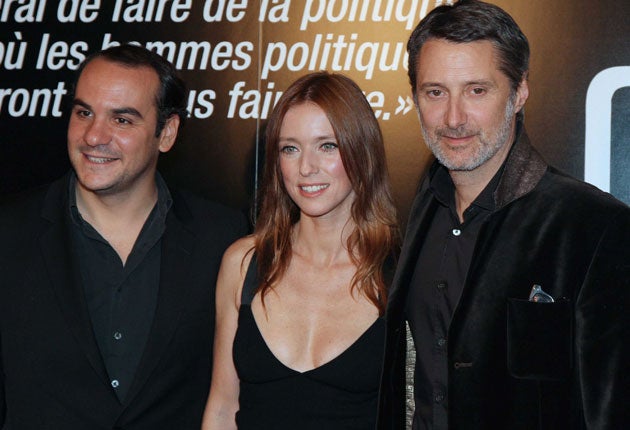Film tells tale of comedian's bid for power
<i>Eurotrash</i> presenter turns director for movie about comic who ran for president

A plump, foul-mouthed figure in stripy overalls and a yellow T-shirt will lumber on to French cinema screens this week, 22 years after his death.
Michel Colucci, better known as "Coluche", a vulgar, tortured stand-up comedian, caused hilarity and consternation in France when he ran for president in 1981. He was one of the first people to crystallise the popular disillusion with mainstream French politicians that persists to this day.
Antoine de Caunes, the former presenter of Eurotrash, is to direct a film about Coluche's brief political career. The result – Coluche, L'Histoire d'un Mec – has won admiring reviews in France but provoked angry complaints from the comedian's widow and sons.
The film presents a much darker, more complex portrait of Coluche than his family had expected. It foreshadows his post-1981 descent into heroin addiction and his death in a motorcycle crash in 1986.
The movie did, however, win an unlikely endorsement from a man who claims to have been a closet fan of the comedian. Former president Valéry Giscard d'Estaing, the victim of many of Coluche's jokes during the 1981 election campaign, said that he did not blame the comedian for his defeat.
M. Giscard D'Estaing revealed that Coluche had apologised to him the following year and confided that he had secretly supported him, not the Socialist victor François Mitterrand. That was certainly not the impression he gave at the time.
Coluche is played in the film by 33-year-old stand-up comedian François-Xavier Demaison. M. Demaison ate four-course meals for months to gain almost a stone for the part. "It was an enormous responsibility, and a great honour, to put on the scared overalls of Coluche," he said.
Michel Colucci, born in 1947, was a school drop-out, florist and failed musician before joining a back-street theatre company Café de la Gare in 1969, whose other members included a certain Gérard Depardieu.
In October 1980, Coluche announced that he would run for President. He said: "I am appealing for the votes of the lazy, the dirty, the drug-addicted, and the alcoholic, of queers, women, parasites, the young, the old, artists and jail-birds... blacks, pedestrians, Arabs, the French, the hirsute, the mad and the transvestite, everyone whom the politicians don't give a stuff for."
The giggles of the mainstream parties froze the following December when polls gave Coluche 16 per cent of the vote – just behind the two main candidates and above a right-wing challenger called Jacques Chirac.
M. de Caunes' film traces the history of the Coluche campaign: the dirty tricks of the mainstream parties and the unexplained murder of one of his campaign managers.
Coluche's younger son, Romain Colucci, complained this week on behalf of his family that the film gave a "simplistic" version of events. "On the pretext of making a film about the campaign, De Caunes has made a film about [my father's] private life," he said. M. De Caunes retorted that his film was "neither a hagiography nor a wrecking-job. It's an independent-minded film, which aims to make people love Coluche all the more."
Coluche pulled out of the race in April 1981, a couple of weeks before the first round of the election. He told Time magazine: "Ideally, I'd like to create enough of a mess to provoke a crisis. What France really needs is a new constitution that distributes power more evenly instead of making the President a virtual monarch."
Twenty seven years later, in the reign of Le Roi Sarkozy, nothing much has changed.
You must be joking: Coluche's sayings
* "Capitalism is the exploitation of man by man. Trade unionism is the opposite."
* "Civil servants should not sleep in the mornings or they will have nothing to do in the afternoons."
* "Politicians spend more money on prisons than schools because they know they are not going back to school."
* "There is not enough work to go around. Leave it to those who like it."
Subscribe to Independent Premium to bookmark this article
Want to bookmark your favourite articles and stories to read or reference later? Start your Independent Premium subscription today.

Join our commenting forum
Join thought-provoking conversations, follow other Independent readers and see their replies